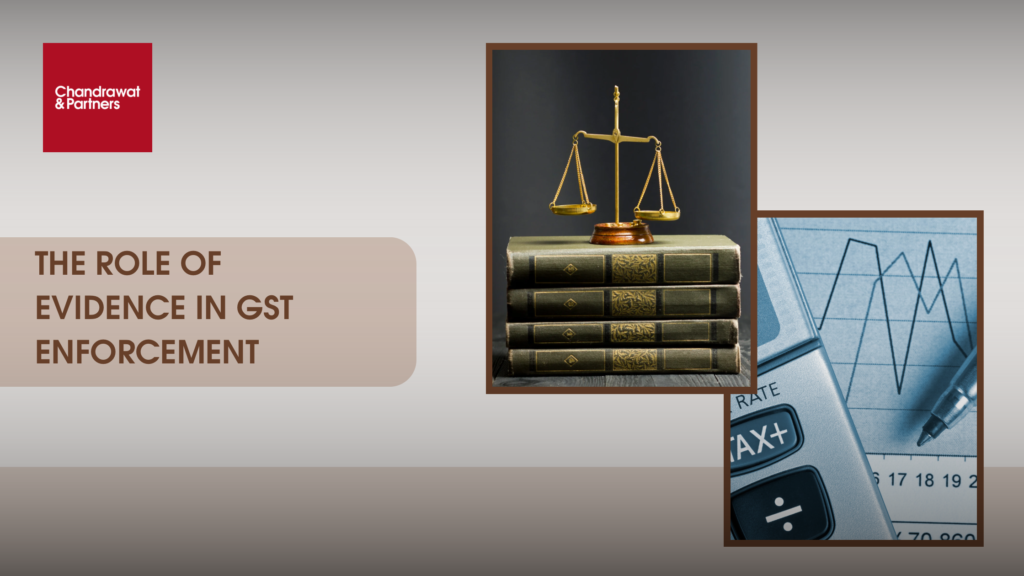
Share :
The Role Of Evidence In GST Enforcement
The Supreme Court of India witnessed a significant legal debate concerning the legality of right of arrest granted to officers under the Customs Act, 1962 and Goods and Services Tax Act, 2017 (“GST Act”). The key issue was whether these officers are bound to adhere to the procedures delineated in the Code of Criminal Procedure, 1973 (“CrPC’”), particularly in cases classified as non-cognizable offences.
CASE BRIEF
The case Radhika Agarwal v. Union of India and Ors., W.P.(Crl.) No. 336/2018, involves a challenge to the provision of the GST Act that allows GST officers to arrest individuals on mere suspicion without requiring verifiable material or evidence. The petitioners argue that such provisions infringe upon the fundamental rights of individuals, particularly the right to liberty and due process guaranteed under Article 21 of the Constitution of India, 1949 (“Constitution”).
The case is anticipated to shed light on the constitutional validity of the provisions allowing GST officers to arrest individuals solely based on suspicion, without the necessity of concrete evidence. The petitioners argued that such provisions undermine the principles of natural justice and due process, and they may seek judicial intervention to either strike down or modify these provisions to ensure that arrests are made only upon the existence of verifiable material evidence.
COURT PROCEEDINGS
Applicability of Article 20(3) of the Constitution and Section 25 of the Indian Evidence Act, 1872
At the outset, Additional Solicitor General (“ASG”) referred to Article 20(3) of the Constitution which prohibits an accused person to be compelled to be a witness against himself and submitted that unless a person is formally accused, either by FIR or complaint, he is not to be treated as “accused” for the purposes of Article 20(3). That is, the protection against self-incrimination shall only apply when a person has been formally “accused”.
Applicability of Sections 2(l), 155(2) and 155(3) CrPC to Customs Officer
ASG pointed to the definition of “non-cognizable” offense under Section 2(l) CrPC to avert that the provision only applies to police officers and not to customs officers. In this context, his argument was that when the Customs Act, 1962 (“Customs Act”) made an offense non-cognizable, it prevented only police officers from arresting.
It was further submitted that Section 155(2) CrPC which provides that a police officer shall not investigate a non-cognizable case without the order of magistrate, does not apply to customs officer. As a result, the prohibition to investigate a non-cognizable case without orders of a magistrate does not apply to customs officer and that they can investigate a non-cognizable case despite the embargo under Section 155(2) CrPC. Moreover, under Customs Act, the permission is required from the Commissioner, not Magistrate.
Adverting to Section 155(3) CrPC which says that a police officer cannot arrest without warrant in a non-cognizable case, ASG contended that the provision only applies to police officers, not to customs officers.
Consequences of making Chapter XII CrPC applicable to Customs cases
AGS contended that if chapter XII CrPC is made applicable and customs officers are held to be “police officers”, a long line of reasoning by constitutional benches would be rendered redundant. Further, cases would no longer be open to investigation until FIR is registered. If FIR is registered and person is made “accused”, Article 20(3) and Section 25 would be invoked.
GST Officers Not ‘Police Officers’: ASG
Further, the AGS contended that GST Officers are not “police officers”. He referred to the dominant purpose test to submit that keeping in view the dominant purpose of GST Act, power to initiate prosecution and make arrest is “incidental”. As such, GST Officers cannot be said to come under the gambit of “police officers”.
It was further argued that GST Act is a special law, conferring special powers, and therefore it excludes the application of Chapter XII CrPC.
No private complaint can be made under GST Act
During the hearing, the bench questioned the possibility of a private complainant under the GST Act. The response indicated a need for verification. However, the bench asserted that GST does not accommodate a concept of “private complainant”. This observation likely reflects the legal framework, which might prioritize governmental or institutional oversight in matters pertaining to GST compliance and enforcement. Such delineation between public and private entities in the context of complaints could be fundamental to maintaining the integrity and effectiveness of the GST regime.
OBSERVATION
The judgment is yet to be made by the Supreme Court but the outcome of this case could have significant implications for the enforcement of GST laws in India, as well as for the protection of individual rights and liberties in the context of tax enforcement.
For more information or queries, please email us at
enquiries@chandrawatpartners.com



